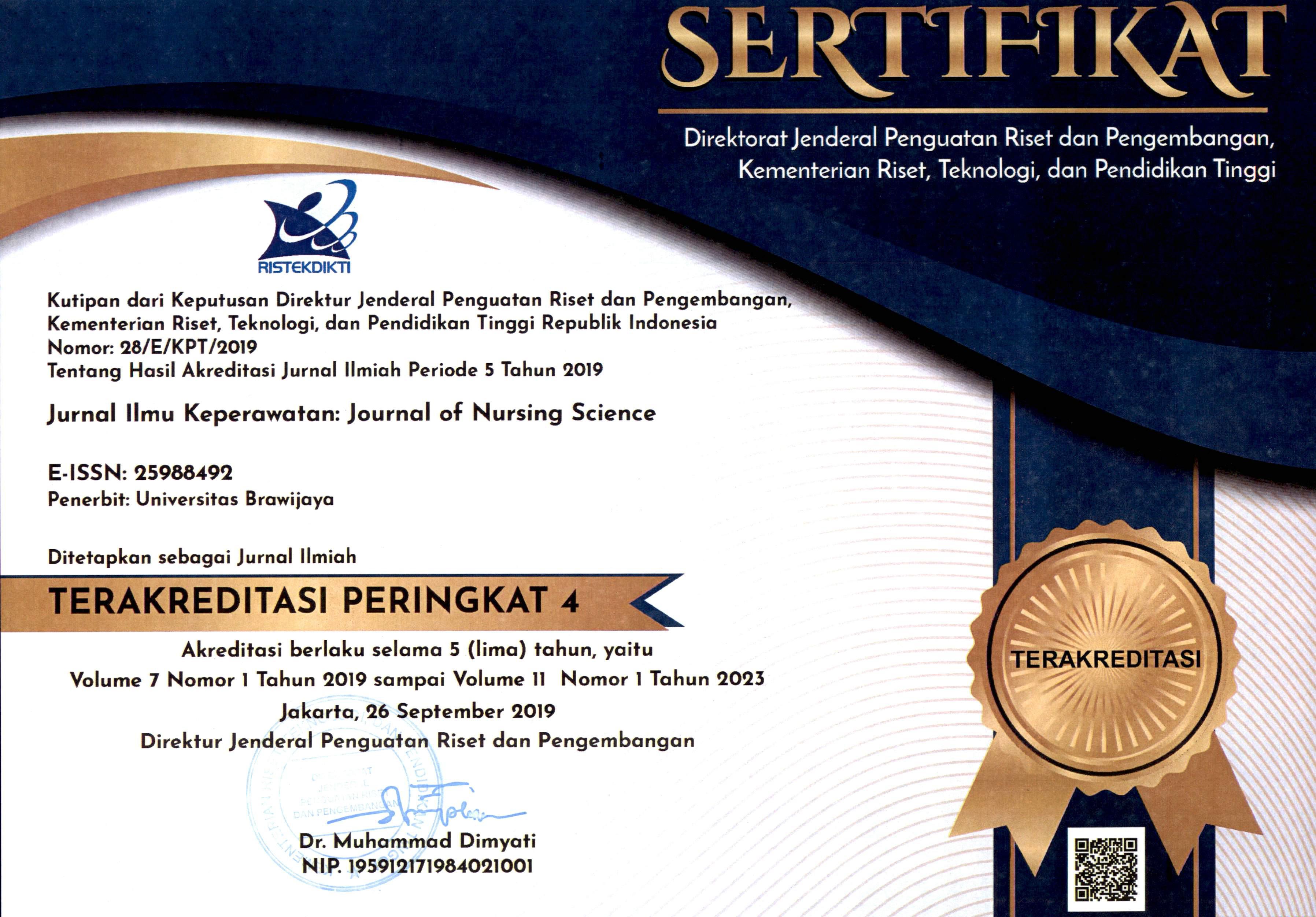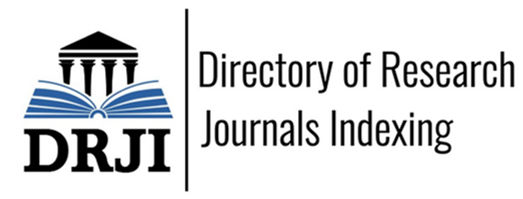EFFECTIVENESS OF MINDFULNESS-BASED COGNITIVE THERAPY (MBCT) TOWARDS DEPRESSION
DOI:
https://doi.org/10.21776/ub.jik.2020.008.01.6Keywords:
Depression, Mindfulness-Based Cognitive Therapy, Randomized Controlled TrialAbstract
Depression is a common mental disorder that is leading cause of disability in the world by 2020 and a major contributor to overall global disease burden. Globally, more than 300 million people of all ages suffer from depression and more women. Depression can affect aspects of life including psychological, physical, and social. MBCT teaches patients through the mind, feelings, and body sensations to see an event temporarily without treating the event as an accurate reality. The aim of this study was to providing information about effectiveness of  MBCT towards depression. The relevant health databases include PubMed, Science Direct, Garuda, Emerald Insight, EBSCO, Google Scholar, Google Search, ProQuest, searched using a combination of keywords: 'mindfulness-based cognitive therapy' and 'depression' and 'randomized controlled trial'. The result were The electronic search of the database identified 633 articles relating to MBCT. Furthermore, checking for duplicate and published articles, 620 criteria-filled studies, 128 full texts of 128 articles, 118 did not meet inclusion criteria for reasons not to investigate MBCT (n = 61), participants were not depressed / depressive disorder (n = 39) not a randomized controlled trial design (n = 14) published in letters, comments, editorials (n = 4). Then, the full text of the manuscripts included in the review amounted to 11 articles. In conclusion MBCT is an effective, acceptable, feasible, accessible, applicable form of mental health psychotherapy that aims to reduce symptoms of depression, anxiety, emotional distress and improve quality of life, improve social well-being, and improve psychological well-being.
References
- Baijesh, A. (2015). Mindfulness Based Cognitive Therapy for Depression among HIV-Infected Individuals. International Journal of Indian Psychology, 3, 2349–3429.
- Coleman, L. H. (2012). Depression: A Guide for the Newly Diagnosed. Canada: Raincoast Books.
- Eisendrath, S. ., Gillung, E., Delucchi, K. ., Segal, Z. ., Nelson, J. ., McInnes, L. ., & Feldman, M. . (2016). A Randomized Controlled Trial of Mindfulness-Based Cognitive Therapy for Treatment-Resistant Depression, 85(2), 99–110. https://doi.org/10.1159/000442260
- Forkmann, T., Wichers, M., Geschwind, N., Peeters, F., Os, J. van, Mainz, V., & Collip, D. (2014). Effects of mindfulness-based cognitive therapy on self-reported suicidal ideation: results from a randomised controlled trial in patients with residual depressive symptoms, 55(8), 1883–1890. https://doi.org/10.1016/j.comppsych.2014.08.043
- Hammen, C. L., & Watkins, E. (2013). Depression Clinical Psychology : A Modular Course. USA: Psychology Press.
- Irwin, M. . (2008). Human psychoneuroimmunology: 20 Years of discovery. Brain, Behavior, and Immunity, 22(2), 129–139. https://doi.org/10.1016/j.bbi.2007.07.013
- Kuyken, W., Hayes, R., Barrett, B., Byng, R., Dalgleish, T., Kessler, D., … Byford, S. (2015). Effectiveness and cost-effectiveness of mindfulness-based cognitive therapy compared with maintenance antidepressant treatment in the prevention of depressive relapse or recurrence (PREVENT): a randomised controlled trial, 4;386(9988), 63–73. https://doi.org/10.1016/S0140-6736(14)62222-4. Epub 2015 Apr 20
- Lam, W. R. (2012). Depression. Canada: OUP Oxford.
- Leserman, J. (2008). Role of Depression, Stress, and Trauma in HIV Disease Progression. Psychosomatic Medicine, 70(5), 539–545. https://doi.org/10.1097/psy.0b013e3181777a5f
- MacKenzie, M., Abbott, K., & Kocovski, N. (2018). Mindfulness-based cognitive therapy in patients with depression: current perspectives. Neuropsychiatric Disease and Treatment, 14, 1599–1605. https://doi.org/10.2147/ndt.s160761
- Mallot, P. (2014). Depression : Practical Guide to Self-Help. USA: New Harbinger.
- Mann, J., Kuyken, W., O’Mahen, H., Ukoumunne, O. ., Evans, A., & Ford, T. (2016). Manual Development and Pilot Randomised Controlled Trial of Mindfulness-Based Cognitive Therapy Versus Usual Care for Parents with a History of Depression, 7(5), 1024–1033. https://doi.org/10.1007/s12671-016-0543-7
- Moragne, W. (2011). Depression. USA: Twenty-First Century Books.
- Murray, C. J. ., & Lopes, A. . (1996). Evidence-Based Health Policy---Lessons from the Global Burden of Disease Study. Science, 274(5288), 740–743. https://doi.org/10.1126/science.274.5288.740
- Mushtaq, S., Gaur, R. K., & Javed, S. (2017). Effectiveness of Mindfulness Based Cognitive Therapy on Quality of Life, Life Satisfaction and Depression of Patients with HIV/AIDS, 6(6). Retrieved from https://wwjournals.com/index.php/ijsr/article/view/11900/11821
- Panahi, F., & Faramarzi, M. (2016). The Effects of Mindfulness-Based Cognitive Therapy on Depression and Anxiety in Women with Premenstrual Syndrome. Depression Research and Treatment, 1–7. https://doi.org/10.1155/2016/9816481
- Peacock, J., & Casey, J. (2000). Depression Perspectives on Mental Health Series. USA: Capstone Press.
- Pots, W. T. ., Meulenbeek, P. A. ., Veehof, M. ., Klungers, J., & Bohlmeijer, E. . (2014). The Efficacy of Mindfulness-Based Cognitive Therapy as a Public Mental Health Intervention for Adults with Mild to Moderate Depressive Symptomatology: A Randomized Controlled Trial. PLoS ONE, 9(10), e109789. https://doi.org/10.1371/journal.pone.0109789
- Schallross, A. ., Gross, J. ., Visvanathan, P. ., Kumar, N., Palfrey, A., Ford, B. ., & Mauss, I. . (2015). Relapse prevention in major depressive disorder: Mindfulness-based cognitive therapy versus an active control condition. Journal of Consulting and Clinical Psychology, 83(5), 964–975. https://doi.org/10.1037/ccp0000050
- Schroevers, M. ., Tovote, K. ., Snippe, E., & Fleer, J. (2016). Group and Individual Mindfulness-Based Cognitive Therapy (MBCT) Are Both Effective: a Pilot Randomized Controlled Trial in Depressed People with a Somatic Disease. Springer US, 7(1339). https://doi.org/10.1007/s12671-016-0575-z
- Schwartz, T. L., & Petersen, T. (2016). Depression : Treatment Strategies and Management ‘Medical Psychiatry Series. New York: CRC Press.
- Segal, Z. V., Williams, J. M. ., & Teasdale, J. D. (2012). Mindfulness-Based Cognitive Therapy For Depression (2nd ed.). USA: Guildford Press.
- Tovote, K. ., Schroevers, M. ., Snippe, E., Emmelkamp, P. M. ., Links, T. ., Sanderman, R., & Fleer, J. (2017). What works best for whom? Cognitive Behavior Therapy and Mindfulness-Based Cognitive Therapy for depressive symptoms in patients with diabetes. PLoS ONE, 12(6), e0179941. https://doi.org/10.1371/journal.pone.0179941
- Van Son, J., NyklÃÄek, I., Pop, V. ., Blonk, M. ., Erdtsieck, R. ., & Pouwer, F. (2014). Mindfulness-based cognitive therapy for people with diabetes and emotional problems: Long-term follow-up findings from the DiaMind randomized controlled trial. Journal of Psychosomatic Research, 77(1), 81–84. https://doi.org/10.1016/j.jpsychores.2014.03.013
- WHO.2018. Depression. Date of access : 09/12/2018.https://www.who.int/news-room/fact-sheets/detail/depression
- WHO.2001.The world health report 2001 - Mental Health: New Understanding, New Hope. https://www.who.int/whr/2001/en/
- Williams, J. M. ., Crane, C., Barnhofer, T., Brennan, K., Duggan, D. ., Fennel, M. J. ., & Russell, I. . (2014). Mindfulness-based cognitive therapy for preventing relapse in recurrent depression: A randomized dismantling trial. Journal of Consulting and Clinical Psychology, 82(2), 275–286. https://doi.org/10.1037/a0035036
Downloads
Published
How to Cite
License
Authors published in this journal agree to the following terms:
1. The copyright of the received article shall be assigned to the journal as the publisher of the journal. The intended copyright includes the right to publish the article in various forms (including reprints). The journal maintains the publishing rights to the published articles.
2. Authors may enter into separate additional contractual agreements for the non-exclusive distribution of the published journal version of the work (for example, posting it to an institutional repository or publishing it in a book), with acknowledgment of their initial publication in this journal.
3. Authors are permitted and encouraged to post their work online (e.g. in an Institutional Repository or on their website) before and during the submission process, as this can result in a productive exchange, as well as earlier and larger citations of the published work.
4. Articles and all related material published are distributed under Creative Commons Attribution-NonCommercial 4.0 International License or CC BY-NC 4.0 license.
JNSU is licensed under a Creative Commons Attribution-NonCommercial 4.0 International License or CC BY-NC 4.0 license.
Most read articles by the same author(s)
- Maria Julieta Esperanca Naibili, Erna Rochmawati, ROLE OF CULTURE TOWARDS COMMUNITY PERCEPTION ABOUT MENTAL DISORDER , Journal of Nursing Science Update (JNSU): Vol. 7 No. 2 (2019)
- Bety Agustina Rahayu, Iman Permana, THE INFLUENCE OF DANGDUT MUSIC TO THE BEHAVIOR OF CHILDREN SCHOOL AGE YEAR IN INDONESIA: A LITERATURE REVIEW , Journal of Nursing Science Update (JNSU): Vol. 7 No. 1 (2019)
- Maria Julieta Esperanca Naibili, Sri Sat Titi Hamranani, Melania Wahyuningsih, Relationship between Knowledge Level and Anxiety Facing Childbirth in Primiparous Mothers at Panembahan Senopati Hospital Bantul , Journal of Nursing Science Update (JNSU): Vol. 10 No. 2 (2022): November





























